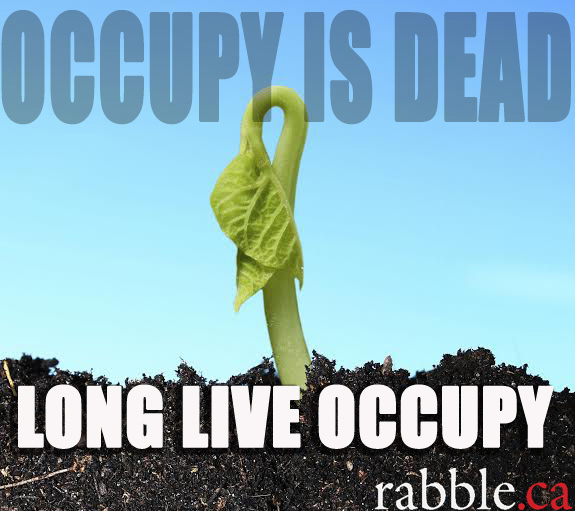“We are the 99%!”
That rallying cry spread worldwide from Wall Street. In Canada, Occupy took hold in cities across the country – from Vancouver, to Winnipeg to Toronto and Halifax.
Three years ago tomorrow, on October 15, 2011, cities across Canada watched Occupy protestors brace for winter. That morning at 10 am, marchers across the country joined to march in solidarity with the protestors on wall street, and rabble.ca was there.
Occupying public space in Canada was no less challenging than creating a long-term Occupy protest on Wall Street, where protestors faced police harrassment and the challenges that arise from living in close proximity to so many other people. Canadian weather presented particular challenges – after the snow fell, most of the folks living in the Occupy encampments moved out to other spaces – but the energy they created has outlasted the encampments themselves.
Though people took to the streets and encampments fighting for economic justice, The Occupy movement was a study in what can grow when activists focused on many causes come together, drawing on a wide range of ideologies and practices for creating social justice.
Starting in September and continuing today, Occupy Central with Peace and Love was the banner under which Hong Kong protestors took to the streets demanding fair elections. This month environmental protectors occupied an MP’s offices in Vancouver to protest the KinderMorgan pipeline. Activists used to hold sit-ins, now they occupy spaces.
But Occupy doesn’t have to take place in physical space. Occupy has, in the wake of continued economic pressure, raised funds to buy and forgive student debt. Occupy has been assigned as a term when local citizens band together to prevent the evictions that arise from the sub-prime mortgage crisis.
Occupy is not just an act, it is an idea. In the words of Linda McQuaig, Occupy has made inequality culturally unacceptable. Does inequality still happen? Yes. Are we ok with that? No.
The conflict between an imperfect reality and visionary progressive ideas that leads to genuine innovation in creating an equitable society. Occupy was not without its detractors. Some folks wrote that it’s very premise was flawed – that North America was already occupied – by European settlers.
Taking up space is a symbolic and time-tested way to assert a radical idea. Occupy is one of the largest and longest-lasting protests to do that in recent history. Since then there have been others: Idle No More and the People’s Climate March, for instance.
To celebrate Occupy and all that has sprung out of it, along with what it meant then and now, rabble.ca is launching a series we call “Occupy is dead. Long live Occupy” to examine the ways in which Occupy has helped many types of social justice activism flourish – and how it has given the idea of solidarity renewed strength across struggles and continents.
rabble.ca has invited a range of writers and contributors to participate in this project and share their reflections on what Occupy means today. Among them are Judy Rebick, Meg Borthwick, Humberto Da Silva, and Krystalline Kraus, who was rabble.ca’s primary reporter during Occupy.
Long Live Occupy.
Image: rabble.ca



